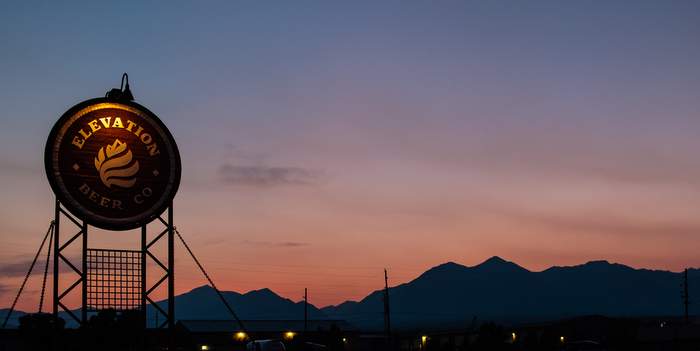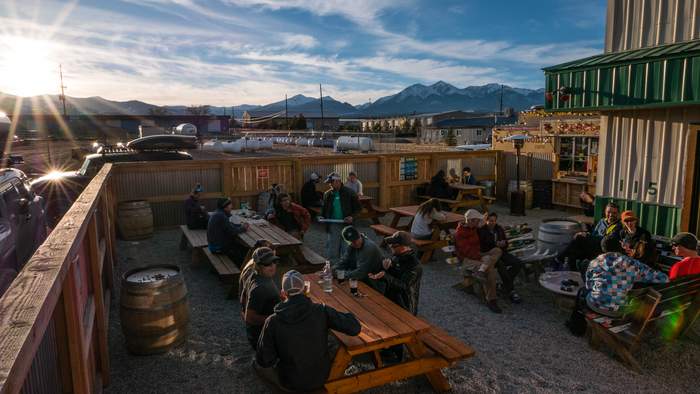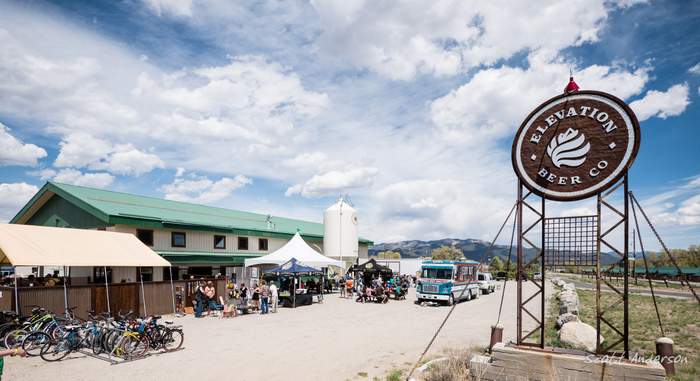
We reached out to Poncha Springs, Colo.-based Elevation Brewing Co. because we were interested in doing an article on growing a profitable brewery in a rural area. Elevation certainly fit this bill. Colorado’s Chaffee County only has around 20,000 residents. The largest employers in the Poncha Springs community are the prison and the hospital. There are some small ski resorts nearby, but Elevation makes most of its bank on-premise in the summer months as outdoorsy tourists flock to the rafting and hiking at the headwaters of the Arkansas river.
Despite the population constraints, Elevation, founded in 2012, grew by 50 percent from 2017 to 2018 and employed 23 people.
“When we first started, the whole story was all around how do we grow this company so that we can employ many people instead of just a few?” said Carlin Walsh, cofounder of Elevation. “How can we employ 20, 30, 40, 50, 60, 100, whatever it is? How do we make a big impact?”
The path toward doing so proved to be its easy-drinking core beers — 8-Second Kolsch and First Cast IPA. This was 2013, and that plan kept Elevation on an (ahem) elevated growth trajectory into 2018. Humming along with 23 employees, they were distributing in Utah and Wyoming in addition to Colorado and pondering some other states and then…
“And then September 2018 hit, and the switch turned off,” Walsh said.
Walsh wasn’t sure of the reason, and it’s likely not just one thing. There are a confluence of unprecedented craft beer market conditions right now, and everyone (Walsh, other breweries, wholesalers, retailers) is just looking to discover their own path forward. Here is how Elevation is finding theirs.
So, what’s the issue?

“Last September, our tasting room didn’t take the hit, but our wholesales just fell off the goddamn cliff. It was the most bizarre thing. I go talk to our wholesaler, and everybody’s saying the same thing. “I don’t know what’s going on suddenly. Our sales are slowing down.”
The slowdown rolled right on into January 2019, which brought grocery store beer sales to Colorado for the first time. Colorado craft breweries, including Elevation, were apprehensive about the change in regulations. Walsh is just one guy representing one under-15,000 bbl brewery, but he has seen a notable change in retail sales since grocery store sales started.
“We’ve seen sales transition over to grocery stores, but they’re not necessarily maintaining the same number of sales that they did at independent stores,” he told us. “So, that was fine. And then, you have the spiked seltzers coming out. We all attributed a sales dip to that, as well. And then, just the rotation nation. Everybody’s wanting constantly new products, and here we are with this focus on our cores because that was what worked.”
Cut to September 2019 and Elevation is re-evaluating its sales strategy.
“The craft beer industry has arguably never seen a shift like this. Because of that, we just have to have an ever-vigilant eye on how our business is doing and how the market is doing and how we’re responding to the market.”
The sales quagmire
“I’m calling bullshit on sales as we know it,” Walsh said, and our ears perk up. There are a lot of issues for small breweries today that he traced back to this over reliance or miscasting of the role of sales reps in craft beer retail sales. Let’s dive into them:
“I think that the industry in general is putting entirely too much effort into sales efforts,” Walsh said. “Unless you’re self-distributing, nobody is actually punching orders. The wholesaler is doing that. What we call salespeople, they’re not actually selling anything. They’re just raising awareness about it.
“Craft beer sales reps have to work their asses off, going out and visiting all these accounts. But when you start looking at the accounts we’re visiting, you start comparing the numbers of CEs we’re selling in those accounts, is it really worth our time to be going out to the account that’s selling five CEs every 60 days? I just don’t think it is.
“I’m struggling with the current sales process because we are doubling efforts on wholesaler and supplier account visits,” Walsh continued. “Sales reps and supplier reps essentially have the same tasks, and it’s inconceivable that our sales reps are able to service all of these accounts. Who represents who anymore?”
I think Elevation’s experience points to a feedback loop that’s perhaps unintentionally grown the rotation nation world we live in when maybe the customer wasn’t demanding it. This feedback loop: When sales are down at wholesale, the brewery’s sales team gets questioned why. The sales team asks their retail accounts for reasons why. The retail accounts (who are just as unsure as everyone else) asks them for something new because customers come in ask for what’s new. That feedback comes back to a brewery. Lather, drink, repeat.
But are customers specifically clamoring for something new, or just generally asking for what’s new on tap because that’s just the nature of the industry that’s formed in front of them within the last decade, as a result of way more breweries and the accidental sales feeback loop outlined above? It feels like an unanswerable “chicken or the keg” question that we will just let linger here in this paragraph.
Being profitable in this new normal

Being a job creator for the area was a big driver of Walsh and Christian Koch opening Elevation in 2013, so much so they baked it into the company’s ethos.
“Because I grew up in rural areas, I’ve always had this pretty deep passion for providing jobs in a rural community. I witnessed firsthand how hard it is to find meaningful, sustainable year-round careers in rural areas. That’s really where my passion came from. It wasn’t so much beer. It was more about how do I create jobs for people that mean something to them that they can go home and be proud about at the end of the day?”
In this uncertain time, how does Elevation maintain its ethos of being a local provider of quality jobs?
“I mean, it’s getting harder and harder, but it’s great. Christian and I have done the best we can to maintain the strongest culture that we can through some of these challenging times. We had to make the decision to lay off a few people off,” Walsh said. “And I think doing that with the person in mind, that this is not just an employee, but this is an actual human being who may own a home or have a family or whatever, and we need to take that into account. And we need to help them stay on their feet as we let them go. So, making phone calls to other employers to see if there’s opportunities for them, being a reference, providing them references. I think that’s really important in a small community, especially where we have limited employment opportunities.”
Making rotation nation work for you
“I would love nothing more than to be able to build a brewery that does two beers. For me, that would be great because I’m a Banquet kind of guy. I love lagers. I love our 8 Second Kolsch. That’s just my jam, but that’s not our consumers. Our consumers want a variety. They want products that are ever-changing. So, because of that, we all have to lose the emotional attachment to these beers. I think that’s the first part of the strategy: being able to critically evaluate the beers you love.
“We have had a lot of fun over the past month or so, engaging the entire company in what should our portfolio look like that 1) makes everybody’s job easier to sell beer and to make beer and 2) gets us all back to having fun with beer. We may not all like milkshakes, but there are a lot of people who do, and so let’s have fun making those.”
In conclusion
“I don’t remember who it was that said it, but I heard the phrase “Volume is vanity and profitability is sanity” And I think that’s where our industry is at now. I would rather be cash-flowing and profitable, and a sustainable business as opposed to constantly reaching for these stars that are very, very difficult to attain right now, especially in this market.”





Andy Macpherson says
With no particular evidence and coming from a homebrewer and craft beer fan, I believe the craft beer industry has been in a bit of a bubble. I’ve been following the industry from the outside. I always toyed with getting involved with a brewery start up. I always had the feeling that the growth in the industry was not sustainable. We shall see.
Rick Boyd says
Great article. I think volume is vanity is very much on point.
For the longest time people dreamed of seeing their beers on supermarket shelves across the country. Now, the reality in a crowded market is that doesn’t make financial sense. On premise sales in YOUR tap room or pub should be the focus.
Borrowing a bit from his comments regarding the wasted resources of a salesforce I would suggest a completely different approach. Put those resources into opening satellite taprooms in larger communities in your immediate area. You’re probably spending over $40k annually on a salesperson and all the travel, samples, lodging etc. Could be considerably more than that. Redirect those funds towards opening new outlets where you can sell your beer yourself and make more money and employ more people that way.